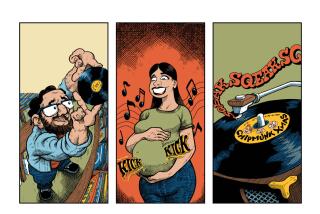Will Those Vinyl Records Be All Played Out by 1990?
- Share via
Vinyl long-playing records--for decades the foundation of the recorded music industry--may not make it into the ‘90s.
“My guess is it’ll be history by 1990,” said Mitch Perliss, director of purchasing for Show Industries, which operates both the 56-outlet Music Plus retail chain and the City 1 Stop wholesaler. “(Vinyl will be) history to the extent that most chain record stores will not be carrying vinyl. I think it has one more Christmas after this, perhaps,” said Perliss, one of several industry figures informally surveyed by The Times.
A bit less pessimistic is Russ Solomon, president of the Tower record and video retail chain. But even he sees vinyl remaining viable only until about 1992.
The statistics bear out these predictions.
In 1973, the 280 million vinyl LPs sold represented 73% of total album sales in the United States (the rest were 91 million eight-track tapes and 15 million cassettes), according to the Recording Industry Assn. of America. By 1987--with eight-tracks long gone and CDs introduced in ‘83--vinyl had dropped to only 17.3% of the market (107 million vinyl LPs to 410 million cassettes and 102 million compact discs), though total album sales had risen considerably.
In dollar terms, the figures dropped along much the same lines, with vinyl going from a 1973 take of about $1.25 billion out of a total $1.8 billion, to only $793 million out of a whopping $5.3 billion in 1987. That’s a drop from 69.4% to less than 15%. Both unit sales and dollar figures for vinyl are expected to show even further decline when the record association releases its latest statistics at the end of this month.
Perliss reports that the Music Plus chain’s sales of vinyl are now only 4% of its total business, half of last year’s 8%. And he expects next year’s figures to shrink in half again. Even Tower, which tends to cater more to vinyl consumers with special-interest items, has seen its vinyl sales drop to less than 20% from a pre-CD level of more than 70%, according to Solomon.
“What you’re seeing is a whole new generation of people being brought up with cassettes and now CDs,” Perliss said, noting that vinyl’s decline predates CDs, with the cassette rising to prominence in the ‘80s. “There are still turntables out there, but people aren’t using them.”
No matter what the figures say, though, most representatives of the record industry seem intent on painting a picture of vinyl as very healthy.
“Vinyl is not dead!” insisted Tower’s Solomon, bristling over recent reports in Billboard magazine that the vinyl long-playing record is soon to be virtually phased out.
“We’re not prepared to get out of vinyl,” concurred Dennis White, president of the Capitol/EMI/Manhattan/Angel (CEMA) distribution group. Representatives of several other major record companies said much the same thing.
“Most people I know (in the record business) are emotionally attached to vinyl,” said David Steffen, senior vice president of sales and distribution for A&M; Records. “I don’t want to picture the day of the record industry without records.”
Yet Steffen acknowledged that it is getting harder to justify keeping some catalogue items in vinyl, because the business just isn’t there. For some titles, once the warehouse supply of vinyl is gone, no new manufacturing will be likely.
Explained Steffen, “In the first 60 days after release of an album, vinyl will take anywhere between 20% to 30% of sales. After that, up to the first year or so, it’s still in the high teens to 30%. But after that it really begins to fall off and our sales become very small on vinyl.”
What Steffen envisions for the future is vinyl becoming a specialty and collectors’ market--much as CDs were until recently.
“I think there will be a fairly large industry in the late ‘90s for vinyl specialty stores,” he said. “And there will be a large market in 10 years for a specialty manufacturer who’s going to go to labels and license titles and pay (the record companies) a small royalty.”
If vinyl is dying, who’s killing it?
Music Plus’ Perliss, in part, blames the record companies for pushing the market away from vinyl. “The record companies are not extending themselves on vinyl. We’ll buy a new release and if it takes off on vinyl, the companies don’t have the product to back it up.”
And one record company, PolyGram, has increased its returns penalty (a surcharge assessed when unsold product is returned to the manufacturer by stores) on vinyl records. This, Perliss says, discourages stores from ordering titles seen as marginal.
But Jim Caparro, PolyGram’s senior vice president of sales and branch distribution, insists that the penalty increase was intended to do just the opposite.
“We wanted to encourage (stores) to keep it out there and sell it off rather than return it,” he said. Vinyl accounts for only 10% of PolyGram’s business (compared to 55% cassette and 35% CD), he noted, “but it’s a healthy 10%. There are over 100 million turntables out there, and there are many loyal vinyl purchasers.”
On the other hand, some at record companies are pointing fingers at retailers for making vinyl buying more difficult.
“A number of retailers have elected to change the structures of their stores . . . to address what they see as the declining sales of vinyl,” Steffen said. “To a great degree it’s a self-fulfilling prophecy. ‘Sales are down to 25%, so I’ll drop it to 25% of my floor space.’ ”
Ultimately, both the retailers and the record companies come down to one shared opinion:
“The consumer will dictate when we get out of vinyl,” said Capitol/EMI/Manhattan/Angel president White, offering a sentiment repeated by all contacted for this article.
And White acknowledged that vinyl’s days are numbered. “What we’ve always said is we should have an orderly demise of vinyl,” he said. “This should be contrary to what happened to eight-track. Woke up one morning and it was dead.”
In any case, the story is far from over: Next year digital audio tape should hit the market. Are the analog cassette’s days numbered, too?
LIVE ACTION: Frank Sinatra, Liza Minnelli and Sammy Davis Jr. will team up Nov. 26 at the Forum. Tickets go on sale Sunday. . . . Rod Stewart and Robert Plant are both returning for another round of Southern California concerts. Stewart will be at the Pacific Amphitheatre on Nov. 11. Tickets go on sale Monday. Tickets will be available sale Sunday for Plant’s Universal Amphitheatre shows on Nov. 30 and Dec. 1. . . . The “Dirty Dancing” tour featuring Bill Medley, the Contours and “Dirty Dancing” dancers will be at the Celebrity Theatre in Anaheim on Oct. 30.
VINYL’S SHARE OF THE ALBUM MARKET
UNIT SALES IN MILLIONS
Vinyl 8-Track Compact Year LPs Tapes Cassettes Discs 1973 280.0 91.0 15.0 0 1978 341.3 133.6 61.3 0 1983 209.6 (negligible) 236.8 0.8 1987 107.0 (negligible) 410.0 102.1 DOLLAR SALES IN MILLIONS 1973 1,246.0 489.0 76.0 0 1978 2,473.3 948.0 449.8 0 1983 1,689.0 (negligible) 1,810.9 17.2 1987 793.1 (negligible) 2,959.7 1,593.6
SOURCE: Recording Industry Assn. of America
More to Read
The biggest entertainment stories
Get our big stories about Hollywood, film, television, music, arts, culture and more right in your inbox as soon as they publish.
You may occasionally receive promotional content from the Los Angeles Times.










